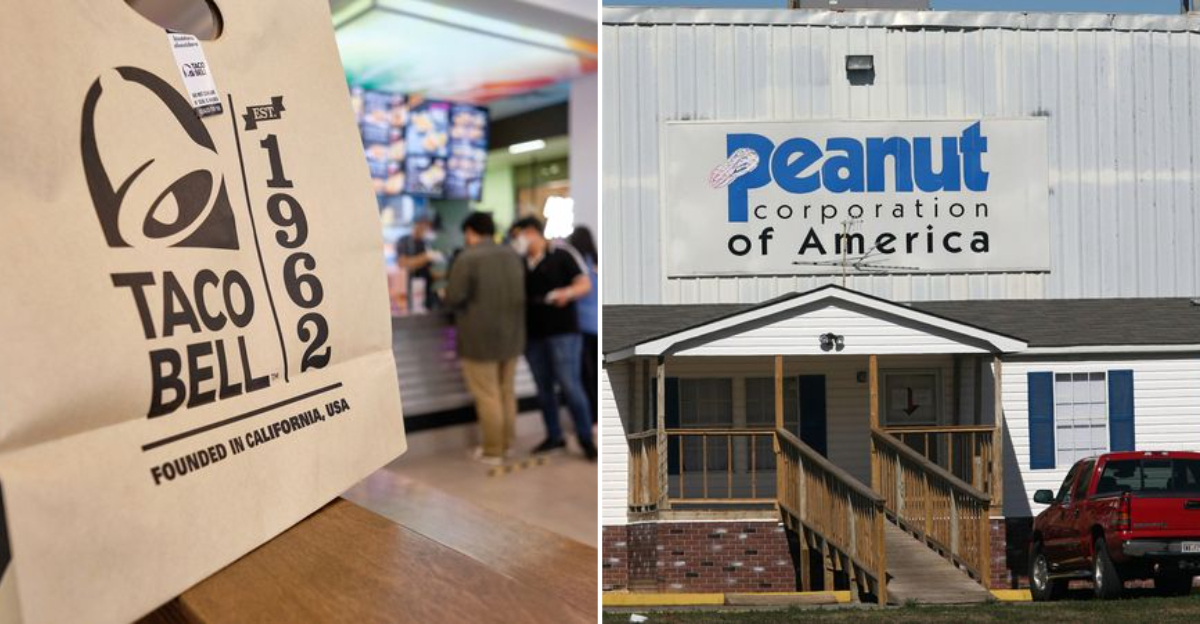14 Of The Biggest Frozen Food Recalls Of All Time

Frozen foods are convenient time-savers for busy families like mine, but sometimes these kitchen staples become health hazards.
I’ve seen several major recalls hit the headlines over the years, making me double-check my freezer contents more than once.
From contaminated meat to foreign objects in our favorite quick meals, these recalls affected millions of products and consumers nationwide.
1. Hallmark/Westland Beef Nightmare
My jaw dropped when I learned about the 2008 Hallmark/Westland Meat Packing Company recall. A staggering 143 million pounds of beef products were yanked from shelves after an undercover video showed workers forcing sick “downer” cows into slaughter.
This remains the largest meat recall in U.S. history. What makes it particularly disturbing is that about 37 million pounds went to school lunch programs across the country. The company eventually shut down completely. I remember frantically checking our freezer that February, tossing several packages of ground beef just to be safe. The recall cost taxpayers millions and permanently changed how meat processing facilities handle sick animals.
2. Peanut Corp. Of America’s Deadly Scandal
Few food recalls have enraged me like the 2009 Peanut Corporation of America disaster. Company executives knowingly shipped salmonella-contaminated peanut products, causing nine deaths and sickening over 700 people across 46 states. The recall affected 3,913 different products containing PCA ingredients. Everything from frozen peanut butter cookies to ice cream had to be pulled from shelves.
This wasn’t just negligence—it was criminal. I followed the court case closely and felt vindicated when the company’s owner received a 28-year prison sentence. His knowledge of the contamination and decision to ship anyway makes this one of the most egregious food safety violations in modern history.
3. Wright County Eggs’ Massive Salmonella Outbreak
Summer 2010 brought egg anxiety to breakfast tables nationwide. Wright County Eggs recalled a mind-boggling 380 million eggs after they were linked to a salmonella outbreak affecting thousands. I remember the panic at my local grocery store—empty egg sections and worried shoppers. Many frozen products containing eggs were subsequently recalled, including breakfast sandwiches and frozen custards.
FDA inspections revealed horrifying conditions: rodent infestations, uncaged hens tracking through manure, and flies too numerous to count. The facility’s owner later pleaded guilty to selling contaminated food. This recall fundamentally changed how I think about egg safety, and I now check recall notices religiously before purchasing any egg-containing frozen foods.
4. StarLink GMO Corn Causes Taco Shell Terror
The 2000 StarLink corn recall haunts me whenever I reach for frozen Mexican food. Genetically modified corn approved only for animal feed somehow contaminated human food supplies, triggering massive recalls of taco shells and other corn products. Kraft Foods pulled millions of Taco Bell frozen taco shells after tests showed traces of the unapproved StarLink protein.
The contamination spread to hundreds of other products, costing the food industry an estimated $1 billion. What shocked me most was learning how easily unauthorized GMO products could enter our food chain. Though no illnesses were conclusively linked to StarLink, the incident sparked heated debates about genetic engineering oversight. I still remember my kids’ disappointment when their favorite frozen taco meals disappeared from our freezer that fall.
5. Topps Meat’s Company-Killing E. Coli Crisis
Nothing ends a backyard barbecue faster than E. coli. In 2007, Topps Meat Company learned this lesson the hard way when they recalled 21.7 million pounds of frozen beef patties contaminated with E. coli O157:H7. The outbreak sickened dozens across eight states. I vividly recall sorting through my freezer, checking date codes against the recall list, and feeling my stomach drop when I found a matching package.
Just six days after announcing the recall, Topps—a company with 67 years of history—shut down permanently. This catastrophic event demonstrated how quickly a food safety crisis can destroy even established businesses. It also made me painfully aware that frozen patties aren’t necessarily safer than fresh meat, despite their longer shelf life.
6. Nestlé’s Hot Pockets Horror Show
“Glass and plastic in Hot Pockets?” I nearly choked on my coffee reading those headlines in 2014. Nestlé recalled 238,000 cases of Hot Pockets after discovering they contained meat from the already-recalled Rancho Feeding Corporation. The original recall occurred because Rancho had processed diseased animals without proper inspection.
Adding insult to injury, consumers reported finding foreign materials like glass and plastic in their supposedly convenient meals. My teenage son was devastated—Hot Pockets were his after-school staple. The recall affected Philly Steak and Croissant Crust Philly Steak and Cheese varieties nationwide. This incident taught me that even big brands aren’t immune to serious quality control failures, and that one contamination can cascade through the supply chain affecting multiple products.
7. Banquet’s Pot Pie Salmonella Scare
Comfort food turned dangerous in October 2007 when ConAgra Foods recalled all Banquet pot pies and store brand varieties due to salmonella contamination. The outbreak sickened at least 272 people across 35 states. I had three boxes in my freezer when the news broke. What troubled me most was the confusion surrounding the recall—initially, ConAgra only issued cooking instructions rather than a full recall, leaving consumers uncertain about product safety.
The CDC investigation revealed an interesting culprit: undercooked pot pies. Many consumers didn’t realize the frozen pies required thorough cooking in conventional ovens, not microwaves. This recall permanently changed product labeling, with clearer cooking instructions now required. I still double-check cooking times on frozen meals, remembering how easily convenience can compromise safety.
8. P.F. Chang’s Metal Fragment Fiasco
Metal shards in your orange chicken? That’s exactly what prompted ConAgra Foods to recall P.F. Chang’s Home Menu frozen meals in July 2016. Small metal fragments were discovered in the sugar used in the sauce packets. Around 195,000 pounds of frozen entrées were affected, including Signature Spicy Chicken and Mongolian Style Beef.
I had just served these exact meals at a family gathering the week before the recall announcement! The fragments came from a broken sugar processing screen that wasn’t caught by quality control. Thankfully, no injuries were reported, but the incident made me wonder what else might be lurking in my favorite convenience foods. After this recall, I started cutting open sauce packets and inspecting them before adding them to dishes—a habit I maintain to this day.
9. TreeHouse Foods’ Waffle Listeria Threat
Breakfast became a danger zone in September 2016 when TreeHouse Foods recalled frozen waffles from 25 states due to potential listeria contamination. The recall included maple-flavored waffles sold under various private labels at Walmart and Aldi. I discovered the recall while scrolling through social media one morning—with a half-eaten waffle already on my plate!
Listeria is particularly dangerous for pregnant women, older adults, and people with weakened immune systems. What made this recall notable was its scope: waffles produced over an entire year might have been affected. The company acted after routine testing found potential contamination at a production facility. Though no illnesses were reported, the incident reminded me how long contaminated products can sit undetected in our freezers, creating a time bomb of foodborne illness risk.
10. Scenic Fruit Company’s Hepatitis A Strawberry Scare
March 2023 brought a particularly alarming recall to my attention. Scenic Fruit Company pulled its frozen organic strawberries from Trader Joe’s, Costco, and other retailers after they were linked to a hepatitis A outbreak. Five people were hospitalized across Washington, California, and Alaska. The FDA traced the contamination to farms in Mexico, highlighting the complexities of our global food supply chain.
Unlike bacteria, hepatitis A can survive freezing temperatures, making frozen berries a perfect preservation method for the virus. I immediately dumped my recently purchased organic strawberries—smoothies weren’t worth liver inflammation! This recall particularly concerned me because we often consume frozen berries without cooking them, which would kill the virus. Now I always check country-of-origin labels on frozen fruit and thoroughly cook berries when possible.
11. Wells Enterprises’ Ice Cream Allergen Mishap
Nothing ruins a summer day faster than discovering your ice cream might contain undeclared allergens. In October 2022, Wells Enterprises recalled select lots of its Blue Bunny, Bomb Pop, and Halo Top ice cream products due to potential peanut contamination. The recall started after a consumer reported finding a Bunny Snacks Wafer product containing peanut residue.
For people with severe peanut allergies, this kind of contamination can be life-threatening. As someone with a nephew who has severe food allergies, this recall hit close to home. The company blamed the issue on a supplier error. What makes allergen recalls particularly frightening is that contamination is often invisible—you can’t see, smell, or taste allergens like peanuts when they’re present in minute amounts, yet they can still trigger severe reactions in sensitive individuals.
12. Rancho Feeding’s Diseased Meat Scandal
The 2014 Rancho Feeding Corporation recall still makes my skin crawl. The company recalled 8.7 million pounds of beef products after it was discovered they processed sick animals without proper USDA inspection. Federal investigators found the company had been processing cows with eye cancer, cutting off their heads to hide the disease.
The contaminated meat found its way into frozen products nationwide, including Hot Pockets and other prepared meals. Four company officials eventually faced criminal charges. This recall perfectly illustrates how one bad actor in the supply chain can affect countless downstream products. I remember spending hours researching which frozen meals might contain the tainted meat. The incident permanently changed how I view processed meat products, making me more conscious of supply chain transparency.
13. Avanti Frozen Foods’ Shrimp Salmonella Outbreak
Summer 2021 seafood plans were derailed when Avanti Frozen Foods recalled various frozen shrimp products linked to a salmonella outbreak. The contaminated shrimp sickened at least nine people across four states, with three requiring hospitalization. The recall expanded multiple times, eventually covering frozen shrimp products sold nationwide under brands like Censea, Chicken of the Sea, and Hannaford.
I found three affected bags in my freezer during a late-night check after seeing the news. What made this recall particularly concerning was the long shelf life of frozen shrimp—products with expiration dates spanning nearly two years were affected. Many consumers might have purchased the products before the recall and stored them for future use. This incident taught me to keep better track of frozen seafood purchases and check recall lists regularly.
14. Nestlé’s Chicken Alfredo Plastic Contamination
Nestlé Prepared Foods gave pasta lovers a scare in November 2020 when they recalled approximately 92,206 pounds of Lean Cuisine Baked Chicken meals. Customers reported finding hard white plastic pieces in their supposedly convenient dinners. The affected products were Lean Cuisine Baked Chicken with Mashed Potatoes and Gravy.
As a working parent who occasionally relies on these meals for quick dinners, this recall hit particularly close to home. The plastic pieces apparently came from a broken conveyor belt in the production facility. This recall highlighted how manufacturing equipment failures can directly impact food safety. Since this incident, I’ve made it a habit to carefully inspect any frozen meal before heating, especially those with sauce that might hide foreign objects. Sometimes convenience comes with hidden costs beyond the price tag.
